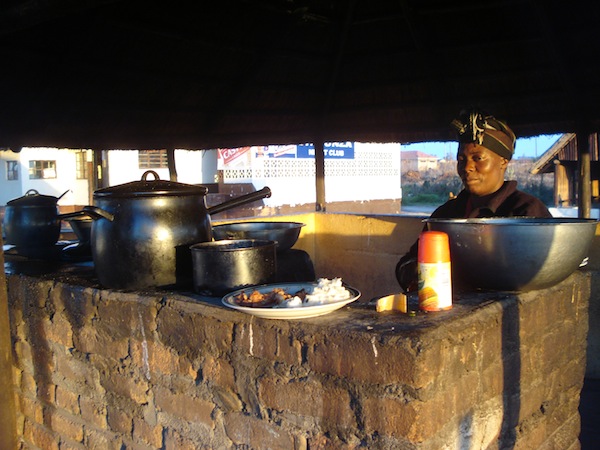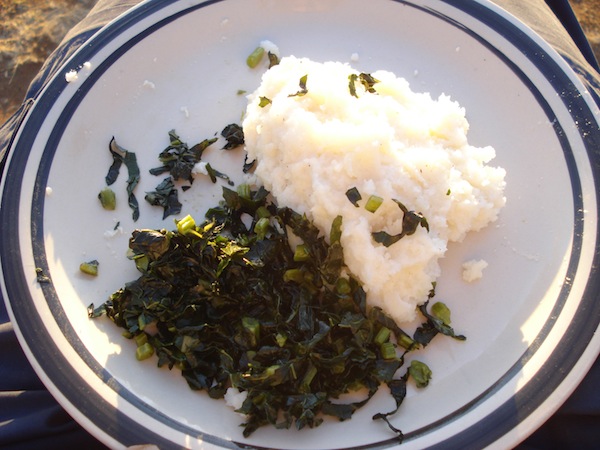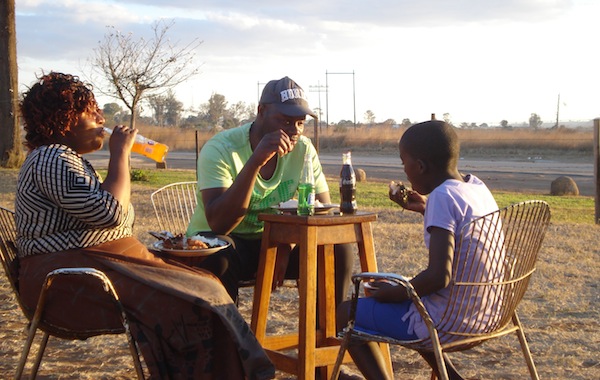2nd September, Marondera – Rusape
After another 90+ km, I feel sore from being hunched over my handlebars all day, but also happy, elated. I arrived here in Rusape as the afternoon light was starting to turn golden, and stopped at the “Motel Crocodile” before the edge of the town to ask if I could camp in the grounds. As the friendly young receptionist called the manager to ask if I could be allowed to stay, I stared at the portrait of a more youthful Robert Mugabe that hung on the wall, his arms crossed in a statesmanlike manner, his gaze earnest and surprisingly not unkind.
I love reaching my destination, putting up my little tent, finally knowing where my bed will be for the night. Today I enjoyed repeating exactly what I did yesterday: I pitched my tent, taking every step in the same order, just working a bit more quickly and surely; I lay out my thin inflatable mattress, sleeping bag and night clothes, with my torch, toothbrush, and book next to my (imaginary) pillow; I washed the day’s dirt and sweat off my body and changed in long trousers, a clean top and flip flops. The comforting beginning of a ritual taking shape. And then, completely refreshed and actually rather excited, I was ready to explore Rusape, described by the guidebook as a “scruffy junction town” which has basic shops, banks and filling stations, “but no other reason to stop”. A description that instantly became a challenge: to find something interesting, remarkable even, in this place.
I didn’t make it far. As soon as I realized that the town must be more than just a few hundred metres away, that the light was fading fast and I hadn’t brought my torch with me, and above all, that the hunger growling in my stomach was too fierce to be ignored, I headed back. And that’s when I noticed a sort of wooden hut by the side of the road, where a lady stood washing large pots and pans.
There were no signs, no menu, no customers. “Sadza?” I asked. “One dollar” was the reply. Perfect. I hadn’t tried Zimbabwe’s staple food yet and right then I could have eaten anything. I washed my hands in the bowl of water the lady offered me, moved a plastic chair into the last rays of sun, and within seconds I was digging in to a huge plate of sadza and greens. The food was hot and filling, and tasted of open fire. I ate with my hands, like locals, looking at the sun set over the vast expanse of land on the other side of the road. The best meal I have had so far.
A large estate car drew up and a couple with their daughter jumped out, leaving their baby in the car. The man snapped his fingers at the cook as if to say “quick, quick, we don’t have much time here” – as if they were just stopping off for a quick dinner on their way to a show. They sat down close to me in the last golden rays of sun and ate their sadza and chicken so fast they were finished before me. I asked them if they were going anywhere, but the man said no, just here, because the sadza is good. And then they hopped back into their car and left, while in spite of my hunger I was defeated by the size of the portion and forced to leave some on the plate.
As I ate, I felt the distance I’ve travelled today slowly sink in. There is something incredibly simple yet satisfying to think that this morning I was somewhere else – somewhere that feels like a long way away – and now I’m here, and all I’ve done all day is ride my bike, on the same road, all day, looking around, stopping every now and again, linking there to here in an unbroken line. The landscape has changed so gradually since Marondera that I can barely say what exactly has changed. Harare feels even further away. There is no going back now. I am headed to the Eastern Highlands, to Nyanga, home to Zimbabwe’s highest mountain.
I imagine the kinds of stories people back home might want to hear, the kind of tales of adventure that are expected when you go off on your own to an untypical tourist destination like Zimbabwe. I have no such stories to tell; not yet, at least. In fact, in many ways, what I’ve done so far feels ordinary. This morning I cooked some porridge over my little stove, packed everything into my panniers, and said goodbye to Nicky, the friendly nightwatchman. He asked to take a picture of me with my bike, and told me that he is waiting to hear back on his application for a visa for the UK, where all his cousins live, and how he hopes to study Fine Art when he gets there. As I got ready to set off, I made sure I know where everything is, because I don’t want to lose or forget anything. I have looked at the day’s route on my map time and again, as if it might speak to me, but the map has remained silent. I don’t know what to expect, but I’ll manage somehow. Cycling and camping, that’s all I’m doing. I’ve done it before on my own, in Europe and this is no different. Perhaps I tell myself this because in truth I am a bit anxious, and I do wonder whether I’ve thrown myself in to something bigger than I can handle. Perhaps that’s why there’s this feeling inside me this is not an adventure, although it may seem exactly that on the outside. Perhaps it’s just that I’m too focused to feel excited about the unexpected right now, I need to not lose control.
Before leaving, this summer, I discovered a whole world out here, online, of blogs written by people who have cycled the length of Africa, across Asia, round the world, you name it. I devoured their tales of adventures, and tips for aspiring adventurers, daydreaming, feeling both envious and inspired. ‘Adventure’ was the buzzword in everything I read: a passion, a way of life, an identity, even a job for some, self-styled ‘professional adventurers’. Many of these blogs advocate adventure as something that everyone should do more of, to challenge, explore and get to know themselves and the world around us in new ways. I couldn’t agree more. I craved it. And yet now that I’m here I find it almost impossible to connect this journey with the idea or feeling of adventure. I am here because I wanted to see the land that for many of my clients was home, before they became refugees. The land that they were forced to leave and cannot return to. I wonder how they feel about it now. Whether they miss it, or whether they would rather never have to think about it again, because the thought alone brings back terrible memories of violence, and loss. I don’t know; it wasn’t my place to ask. I can only think about how radically different my journey is from theirs, as I have the freedom and luxury to visit a homeland they cannot and might not want to ever go back to. I know that deep down that I wouldn’t be here if I didn’t crave the challenges and the excitement of travelling in a far off land, yet I also feel so painfully aware of the sadness and suffering that some of my Zimbabwean clients have been through that I cannot bring myself to think of this journey simply as an adventure.
These thoughts spin in my head all morning as I cycle. The road is similar to yesterday, perhaps a bit quieter. Occasionally a big truck thunders past me, or I hear the rattle of a Zupco public transport bus, unmistakeable thanks to its bright blue and yellow colours, propaganda posters for the Zanu PF Women’s League, and the pile of luggage strapped on to the roof. I wave and smile at all the people I pass along the road, and some strike up a conversation, asking me where I’m going, where I’m from, and all sorts of unexpected questions, like whether I’m in a race, where the others are, or whether I’m here for research. It doesn’t seem to occur to anyone that I’m here for a holiday, and when I say I am then the usual response is to ask which other countries I’ve been to, and whether I am going to South Africa next. No, only Zimbabwe, I say. I’m visiting.


